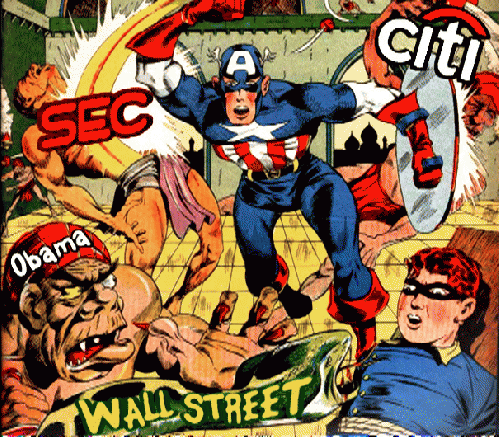In an audacious move against Citigroup, the SEC, and the practice of "selling immunity", a Federal Judge in a NY District Court abruptly put the brakes on a settlement agreement proposed between the Obama Administration and another giant Wall Street firm accused of betting against their own investors.
Judge Jed Rakoff sent a message today to Wall Street and the Securities Exchange Commission that may send shockwaves through the financial world, refusing to approve a $285 million dollar payout to drop an investigation against Citigroup for defrauding investors without admitting any guilt.
Business Insider's haunting pullquote is a somber reminder of a core message of the Occupy movement. : "Judge Rakoff: Truth is Confined to Secretive, Fearful Whispers"
You might recall last year Goldman Sachs paid a $535 million dollar settlement "without admitting guilt" in a case brought by investors claiming fraud in a somewhat similar collateralized debt obligation scam. Goldman squirmed by, conceding they had provided 'incomplete information' but in this case, Citigroup had profited more blatantly at the expense of their clients.
With prosecutions for bank fraud today at a twenty year low, the Occupy movement has widely decried the questionable glad-handing between Wall Street titans and federal officials who are supposed to keep them honest. On his way out in 2008, President Bush issued a DOJ directive that encouraged the practice of "deferred prosecutions" which gave DOJ and SEC desk jockeys incredible latitude to craft immunity deals in secret in exchange for millions in fines and promises to be better.
But you might be disgusted to learn that the fines paid out to the government were at times equal to the payments made to legal firms, enriched by banks as grants of immunity prevented victimized investors from seeking further damages.
Rakoff's stand is consequential because any finding of guilt at last empowers the little-guy investor to bring civil suits.
As we contrast coverage of this ruling in the NY Times' Behind Rakoff's Rejection of Citigroup Settlement with Rupert Murdoch's Wall Street Journal piece Citi Ruling Could Chill SEC, Street Legal Pacts, taxpaying voters might wonder what in God's name 'street legal' pacts means.
Indeed, this might be heralded as a rousing victory by #OWS protestors who in recent weeks have seen a number of anti-Wall Street actions proposed by leaders in business, politics and clergy.
#OccupyWallStreet was just weeks old when Bill Gates, America's richest citizen taxpayer stood up in front of the G20 in France calling for a 'Robin Hood Tax' that would impose as little as a one-tenth of a penny fee on stock or bond transactions. Gates explained massive volumes of speculative, volatile computerized trades were preventing more productive sectors of business from attracting sorely needed capital.
The call for this same transaction fee was echoed by the Pope as part of his updated canons against the "obscene" unethical accumulation of wealth, intentionally hoarded "at the expense of others".
In Congress, Senate bills recently proposed call for Constitutional amendments to reverse the Citizens United ruling that granted horribly lopsided new powers for the wealthy to crowd out political messaging during elections via unlimited, anonymous media spending.
Not surprisingly, the Senate bill, co-sponsored by Chuck Schumer, Jeff Merkeley, Tom Udall, Sheldon Whitehouse, and Dick Durbin has been "whitewashed" for weeks - given virtually no coverage by the major media networks who expect to reap exorbitant profits on upcoming US elections for selling prime-time ad spots.
The failure of the so-called Super-Committee is also supposed to have steeled populist candidates to run against Republicans whose crucial 'sticking point' was the claim that raising taxes on the rich would stifle job growth. They called revenue increases as "a job-killing tax hike on small business." But Brookings debunks this: "less than 2 percent of tax returns reporting small-business income are filed by taxpayers in the top two income brackets".
Putting up a first-of-it's-kind roadblock in the decades long slide towards rigged backroom settlements, Rakoff noted the proposed deal would have benefitted Citi and the SEC - but not the public interest.
(Note: You can view every article as one long page if you sign up as an Advocate Member, or higher).





